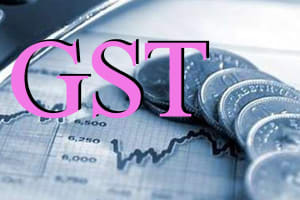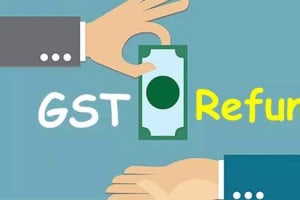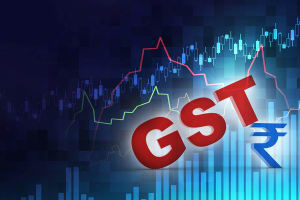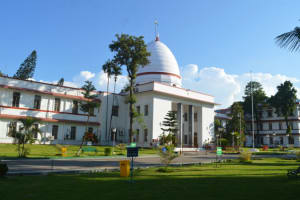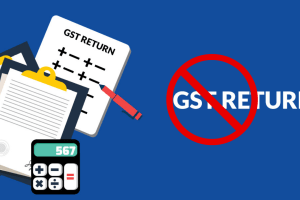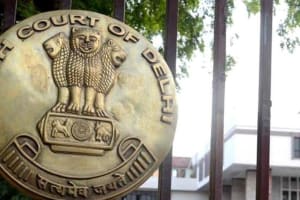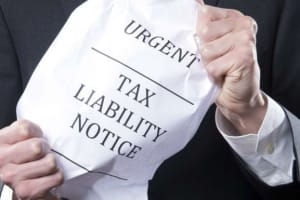GST Refund application filed manually cannot be returned without processing
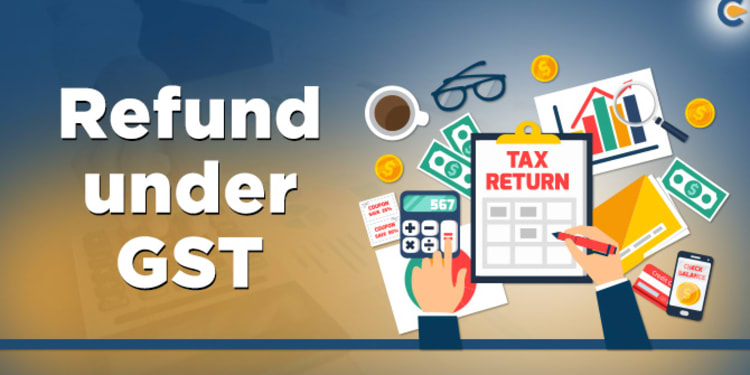
In this case, the petitioner applied manually on 10th June, 2021 and 22nd June, 2021 for FY 2018-19 and 2019-2020. Such applications were returned without being processed with an instruction that in terms of Circular No. 125/44/2019-GST dated 18th November 2019, a refund application has to be filed in FORM GST RFD 01 on the common portal and the same has to be processed electronically, with effect from 26th September 2019.
In this context, the High Court analyse the Rule 97A of CGST Rules, 2017 and observed as under:
9. Since rule 97A contains a non-obstante clause, it is intended to override rules 89 to 97 of the CGST Rules forming part of Chapter X. The plain and simple construction of rule 97A is that despite rule 89 providing for electronic filing of applications for refund on the common portal, in respect of any process or procedure prescribed in Chapter X any reference to electronic filing of an application on the common portal shall, in respect of that process or procedure, include manual filing of the said application. If indeed the argument of Mr. Mishra that no application in any form other than online can be received and processed is accepted, rule 97A would be a dead letter and rendered redundant. Rule 97A cannot be construed in a manner so as to defeat the purpose of legislation. We, therefore, conclude that the impugned circular would certainly be applicable to all applications filed electronically on the common portal, but the impugned circular cannot affect or control the statutory rule, i.e., rule 97A of the CGST Rules or derogate from it.
The full judgement is as under-
1. Having failed to upload "Statement 5B" along with refund applications which were filed online, the petitioner applied manually on 10th June, 2021 and 22nd June, 2021 for F.Y.s 2018-19 and 2019-2020. Such applications were returned without being processed with an instruction that in terms of Circular No. 125/44/2019-GST dated 18th November 2019 (hereafter "the impugned circular", for short), a refund application has to be filed in FORM GST RFD 01 on the common portal and the same has to be processed electronically, with effect from 26th September 2019. Such an instruction is contained in letter bearing F. No. CGST/RGD/Div-II/Tech-I/Misc/21-22, New Panvel, dated 27th July 2021 issued by the Superintendent, Tech-, Division-II, CGST & C. Ex., Raigad (hereafter 'the said Superintendent", for short). Aggrieved thereby, this writ petition dated 4th September 2021 has been presented before this Court seeking, inter alia, the following relief: -
| "(a) | that this Hon'ble Court be pleased to issue a Writ of Certiorari or a writ in the nature of Certiorari or any other writ, order or direction calling for the records pertaining to the Petitioner's case and after going through the facts of the Petitioner's case hold and declare that impugned circular no. 125/44/201-GST dated 18-11-2019 in so far as it creates a condition that the refund application has to be filed online only as being wholly beyond the parent provisions (i.e. Section 54, section 16 and section 168(1) of CGST Act, 2017 and Rule 89 of CGST Rules, 2017) and hence, ultra vires the Act; | |
| (b) | that this Hon'ble Court be pleased to issue a Writ of Certiorari or a writ in the nature of Certiorari or any other writ, order or direction calling for the records pertaining to the Petitioner's case and after going through the facts of the Petitioner's case hold and declare that the Petitioner is entitled to file a refund application manually as well, if he is not in a position to file the refund application online." |
2. Mr. Raichandani, learned advocate for the petitioner has invited our attention to rule 97A of the Central Goods and Services Tax Rules, 2017 (hereafter "the CGST Rules", for short) and contended that such rule permits processing of an application for refund filed manually and not on the common portal as referred to in the impugned circular. According to him, the terms of rule 97A of the CGST Rules are such that an application filed manually has to be accepted and an order passed thereon one way or the other. It is contended that the said Superintendent acted illegally in not accepting and processing the application for refund. The writ petition, he submits, ought to succeed by granting relief claimed in terms of prayer clauses (a) and (b).
3. A short reply affidavit has been filed by the respondents contesting the petitioner's claim and bringing on the record the impugned circular.
4. According to Mr. Mishra, learned advocate for the respondents, the said Superintendent who issued the letter dated 27th July 2021 is bound by the terms of the impugned circular and, therefore, was disabled from accepting the application for refund filed by the petitioner manually. He has referred to a decision of the Gujarat High Court reported in 2020 (32) G.S.T.L. 321 (Guj.) (F.S. Enterprise v. State of Gujarat), which we propose to deal with hereafter. Resting on such authority, it is submitted that no illegality has been committed by the said Superintendent. As regards rule 97A, paragraph 6.1 of the reply affidavit has been referred to where it is pleaded that "any provisions of Rules under the said Chapter X of the CGST Rules, 2017 when applicable for 'electronic filing' shall also be applicable for 'manual filing'." Therefore, it is urged that the writ petition may not be entertained and the petitioner ought to file the application for refund in the manner prescribed by the impugned circular.
5. We have heard the parties and perused the materials on the record, including the statutory provisions as well as the impugned circular.
6. The origin of the impugned circular can be traced to section 168 of the Central Goods and Services Tax Act, 2017 (hereafter "the CGST Act", for short), which empowers the Central Board of Indirect Taxes and Customs (hereafter "the Board", for short) to issue such orders, instructions or directions to the central tax officers as it may deem fit and thereupon all such officers and all other persons employed in the implementation of the CGST Act shall observe and follow such orders, instructions or directions. There can hardly be any dispute that the said Superintendent was under an obligation to follow the terms of the impugned circular. However, it is axiomatic that the said Superintendent is also equally bound by the CGST Act and the CGST Rules and could not have turned a blind eye to rule 97A of the CGST Rules. In our considered opinion, the said Superintendent failed to appreciate that the impugned circular could not have been ignored on the face of rule 97A, which is equally binding on him in the discharge of his duties. We say so for the reason that follows.
7. Chapter X of the CGST Rules is titled "Refund" and begins with rule 89. Rule 89 provides for the procedure to be observed while applying for refund of tax, interest, penalty, fees or any other amount. In terms of sub-rule (1) of rule 89, such an application could be made by the person eligible therefor electronically in FORM GST RFD-01 through the common portal, either directly or through a Facilitation Centre notified by the Commissioner. We need not refer to the other sub-rules of rule 89 and the provisos appended to some of such sub-rules as well as rules 90 to 97, because the same have not been shown to us to be relevant for the purpose of a decision on this writ petition.
8. Adverting to rule 97A, which is the sheet-anchor of the petitioner's claim, we find that the same was inserted in the CGST Rules by a notification dated 15th November 2017 and is the last rule in Chapter X. Obviously, such insertion was in exercise of the rule-making power conferred on the Central Government by section 164 of the CGST Act. It would be appropriate to reproduce below rule 97A in its entirety for facility of convenience: -
"97A. Manual filing and processing.—Notwithstanding anything contained in this Chapter, in respect of any process or procedure prescribed herein, any reference to electronic filing of an application, intimation, reply, declaration, statement or electronic issuance of a notice, order or certificate on the common portal shall, in respect of that process or procedure, include manual filing of the said application, intimation, reply, declaration, statement or issuance of the said notice, order or certificate in such Forms as appended to these rules."
9. Since rule 97A contains a non-obstante clause, it is intended to override rules 89 to 97 of the CGST Rules forming part of Chapter X. The plain and simple construction of rule 97A is that despite rule 89 providing for electronic filing of applications for refund on the common portal, in respect of any process or procedure prescribed in Chapter X any reference to electronic filing of an application on the common portal shall, in respect of that process or procedure, include manual filing of the said application. If indeed the argument of Mr. Mishra that no application in any form other than online can be received and processed is accepted, rule 97A would be a dead letter and rendered redundant. Rule 97A cannot be construed in a manner so as to defeat the purpose of legislation. We, therefore, conclude that the impugned circular would certainly be applicable to all applications filed electronically on the common portal, but the impugned circular cannot affect or control the statutory rule, i.e., rule 97A of the CGST Rules or derogate from it.
10. The proposition of law laid down in F. S. Enterprise (supra) that officers and all other persons employed in the institutions governed by the CGST Act and the CGST Rules are bound by instructions issued by the Board under section 168 of the CGST Act admits of no doubt. However, such decision did not lay down the law, as it could never have, that in a given case governed by a statutory rule the tax officers would be at liberty to elect and apply the orders, instructions or directions issued under section 168 of the CGST Act ignoring such statutory rule framed under section 164 thereof while discharging public duties entrusted to them. For the reasons we have assigned above, such decision does not advance the case of the respondents.
11. We, therefore, dispose of this writ petition with the following order: -
| (i) | the impugned circular is clarified and it is observed that its terms shall be applicable only to applications filed electronically on the common portal but would have no applicability to an application for refund which is filed manually; | |
| (ii) | the letter dated 27th July 2021 issued by the said Superintendent stands set aside; | |
| (iii) | the petitioner is permitted to file afresh the application for refund manually within a fortnight from date and on such receipt, the said Superintendent shall process the same and ensure that the application is taken to its logical conclusion in accordance with law as early as possible, preferably within 2 (two) months thereof; and | |
| (iv) | should the application be rejected, the order must have the support of reasons but if it succeeds no time shall be wasted to effect refund to the extent the petitioner is found eligible. |
12. The writ petition stands allowed on the aforesaid terms. There shall be no order as to costs.
Citation:
WRIT PETITION NO. 7861 OF 2021

